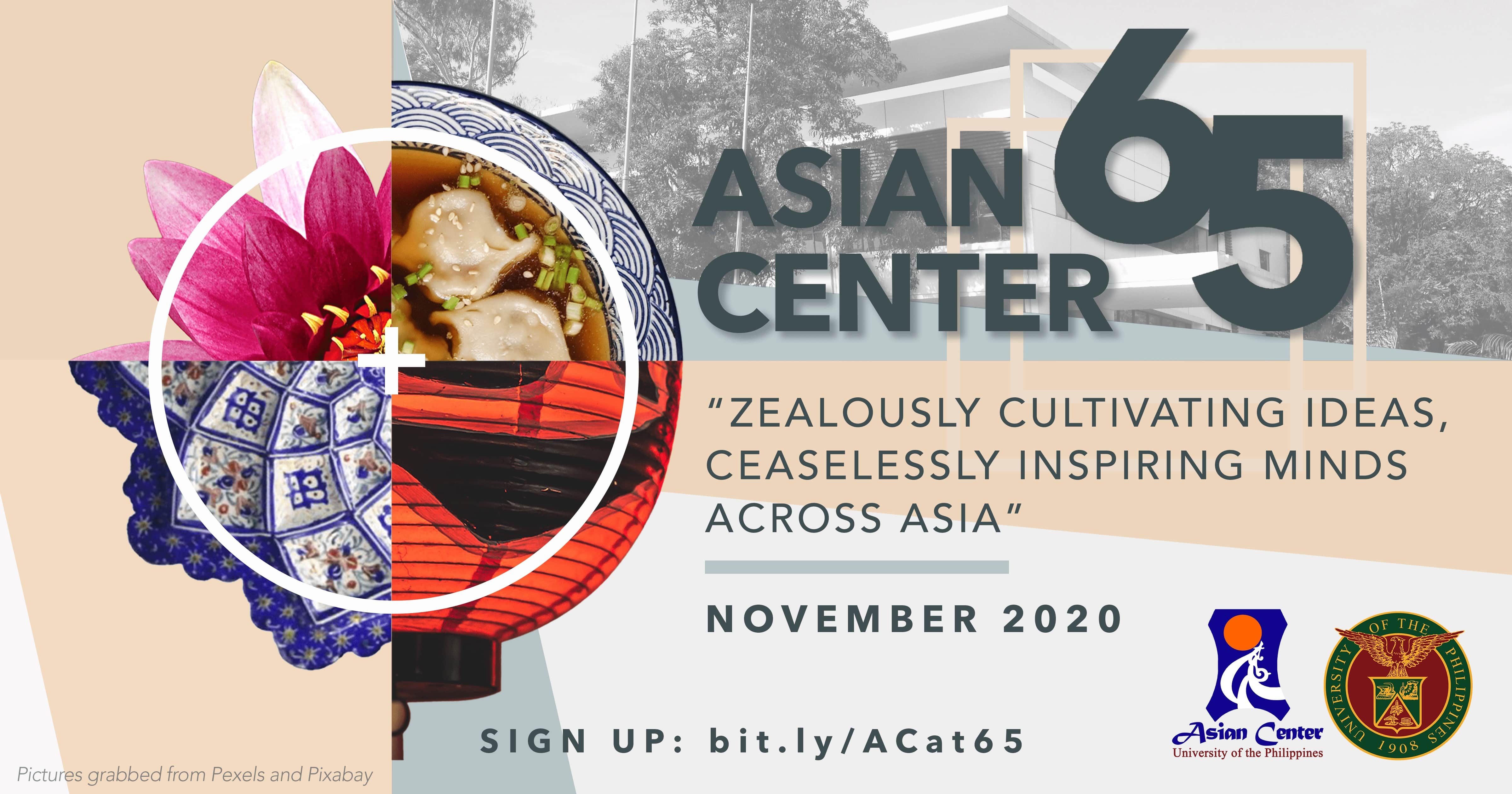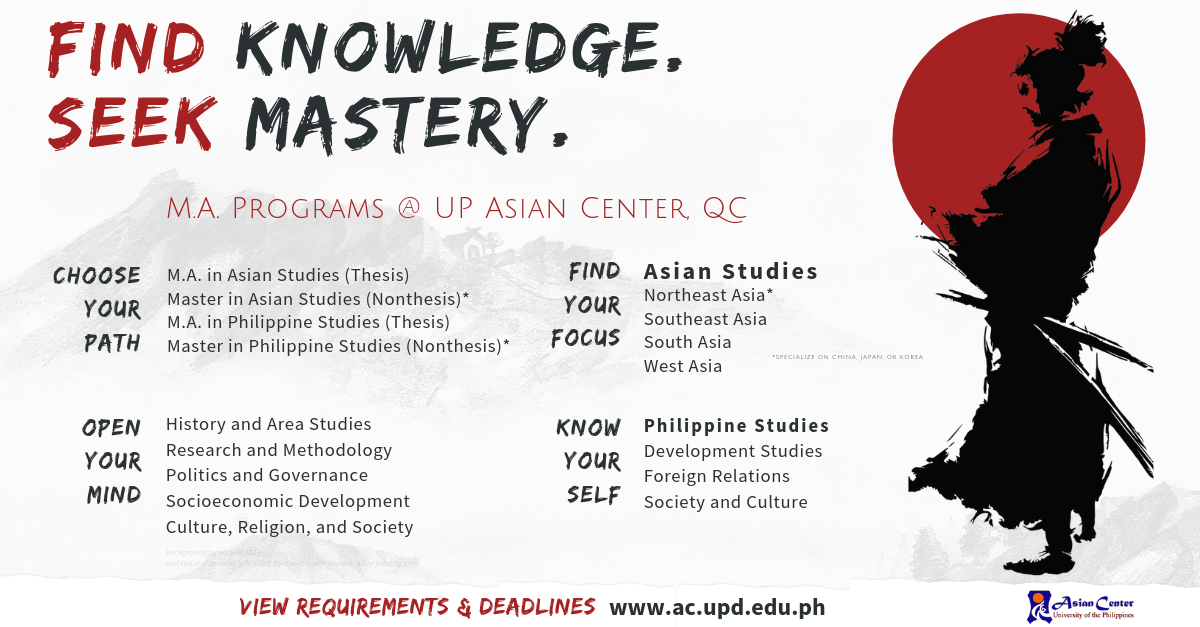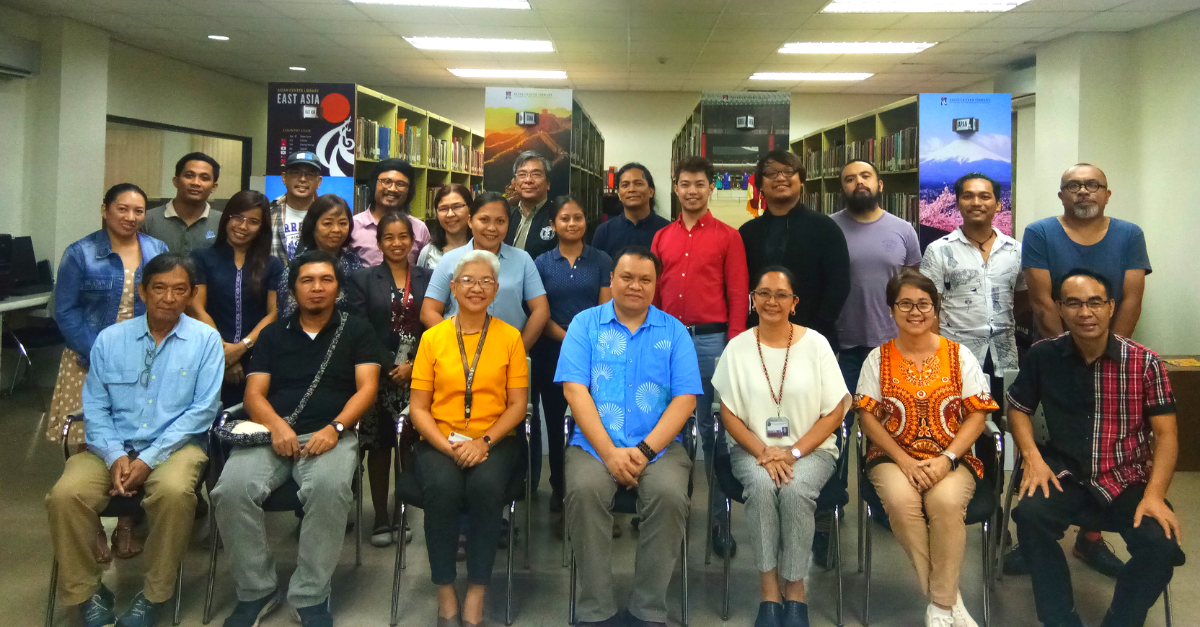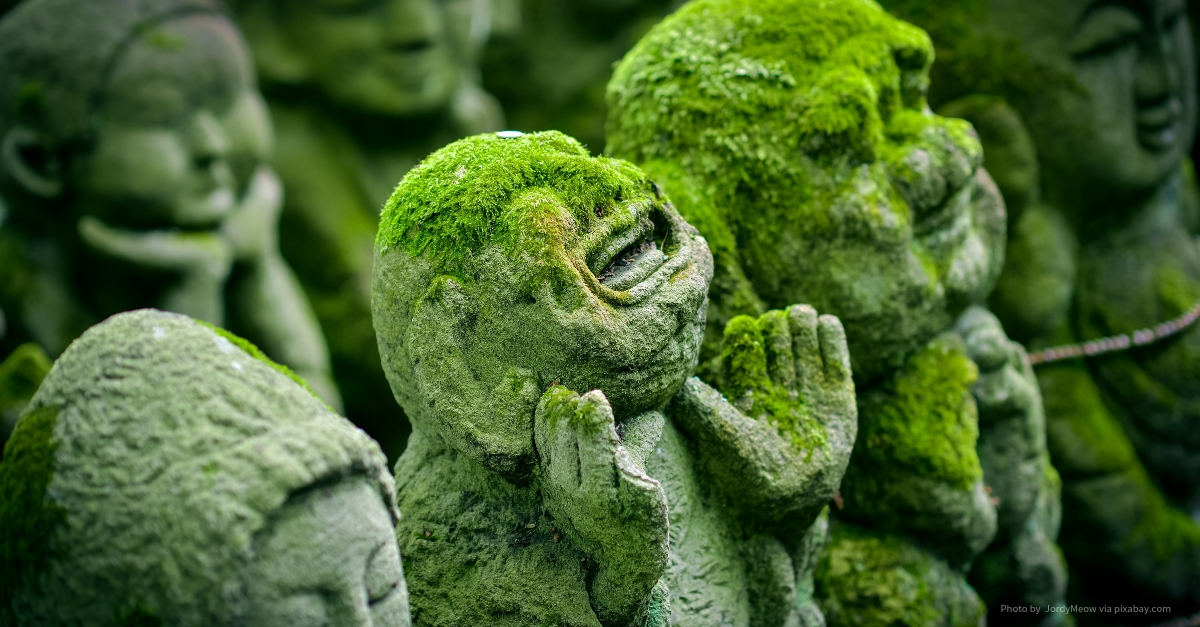The UP Asian Center will be holding a series of webinars and book collection launch this November as part of its 65th anniversary activities, all under the theme, Asian Center at 65: Zealously Cultivating Ideas, Ceaselessly Inspiring Minds Across Asia. The events are free and open to the public. All online events require signing in to an authenticated Zoom account.
LIST OF ACTIVITIES
-
Recent Developments in Inter-Korea Relations | A Webinar
DATE & TIME
2 December, 2 pm, PHT | Via Zoom
THE WEBINAR
This webinar aims to explore recent issues and events that transpired between North and South Korea such as the NoKor’s Nuclear Weapons Program, the summit meetings, and the Trump-Kim meetings. It then seeks to analyze the impact and effects of these events to the domestic political conditions in the two countries.
THE SPEAKER
Prof. Eui Hang Shin is a Distinguished Professor Emeritus in the Department of Sociology, University of South Carolina and a Visiting Research Fellow, Asia Center, Seoul National University. He received his BA in Sociology from Seoul National University in 1964, his MA in Demography from University of Pennsylvania in 1968, and his PhD in Demography from University of Pennsylvania in 1971. His research interests are the political demography of Korea and international higher education. He has neary 70 articles published in reputable journals. His recent work includes Undergraduate Education at Prominent Institutions of Higher Education in the United States, United Kingdom, and Japan (2017).
SIGN UP: YES, I WILL ATTEND.
-
Bap Meogeureo Gaja! A Korean and Filipino (Fusion) Cuisine Demonstration
DATE AND TIME
2 December 2020, 10 am - 12 nn, Philippine time, via Zoom.
ABOUT THE EVENT
This webinar shall introduce two famous Korean foods, bulgogi and kimchi chigue. Bulgogi is Korean equivalent of grilled beef or barbecue. Kimchi-jjigae or kimchi stew is a jjigae, or stew-like Korean dish, made with kimchi and other ingredients, such as pork or seafood, scallions, onions, and diced tofu. It is one of the most common stews in Korean cuisine. The cuisine demonstration shall give a glimpse of how the authentic dishes and the fusion are made by two chefs, a Korean and a Filipina.
They will demonstrate how these are cooked similarly and differently. Some Korean words about the ingredients will also be introduced. Beyond mere knowledge of how these cuisines are prepared, a deeper understanding of Korean culture would be explored in this webinar through an exploration of the language used, their history, and how they are being ‘modified’ to suit the taste of non-Koreans.
ABOUT THE SPEAKERS
-
-
Chef Bogung
Owner of the local food market, "Dalkomhan Bapsang"
-
Dr. Jeongho Cha
Professor of Science Education, Daegu University
-
Jennifer Oliveros Villareal
President of the Filipino Community in Gimcheon, under the Tamunhwa Center
-
Prof. Arnelyn M. Torres
Tourism Management Department, Keimyung University
SIGN UP: YES, I WILL ATTEND!
-
Peter Boomgaard Southeast Asia Collection: A Virtual Launch and Special Lecture
DATE & TIME
25 November, 5-7 pm, PHT
FINDING INTIMACY: NOTES ON PAIN AND PLEASURE IN ASIAN HISTORIOGRAPHY | A LECTURE
Peter Boomgaard's path-breaking book, Children of the Colonial State: population growth and economic development in Java, 1795-1880, published in 1989, radically changed the way historians of Indonesia think about Java's social and economic development in the 19th century. In just one of many exceptionally well-argued chapters, Boomgaard makes the persuasive case for the inclusion of marriage customs, family life, and sexual behavior in economic analysis. Ranging from 9th century temple reliefs and sculpture, to indigenous literatures and foreign travel accounts, this lecture highlights practices of sex, birth, contraception, courtship, and the characteristics and dissolution of marriage, across cultures, time, and space, to discuss the central importance of intimacy and eroticism in Asian historiography. This lecture will be delivered by Dr. Raquel A.G. Reyes, of the School of Oriental and African Studies, University of London.
ABOUT THE COLLECTION
The “Dr. Peter Boomgaard Southeast Asia Collection” holds approximately 1500-2000 books, monographs and edited volumes, including data materials from Indonesia's National Archive in Jakarta. Largely written in English and Dutch, the materials in the collection focus on disparate subjects ranging from economic, social, cultural, environmental, agricultural (forests, non-timber products, staple crops including rice and sugar), and scientific histories of Asia (mainland and southeast), particularly Indonesia. It also includes miscellaneous works on European history and politics.
The collection also consists of 10 boxes of journals, which include Environmental History, Journal of Economic and Social History of the Orient, Environment, and History. The over 20 boxes of archive data sources culled from Indonesia's National Archive are organized by geographic region. These sources, covering the period from 1600 to 1950, are largely statistical, compiled from colonial government censuses relating to births, marriages, and deaths.
A handwritten card reference catalog by Dr. Boomgaard is also a notable inclusion in the collection, which will be valuable for researchers working on topics concerning demographic, agricultural, and labor history of the Dutch East Indies. The collection was donated by his widow, Dr. Raquel A.G. Reyes, a historian and newspaper columnist.
ABOUT DR. PETER BOOMGAARD
Dr. Boomgaard (1946 – 2017) was a Distinguished Professor of Environmental and Economic History of Southeast Asia at the University of Amsterdam. He was a former director of the Royal Netherlands Institute for the study of Southeast Asia and the Caribbean (KITLV), the University of Leiden, and honorary professor at the University of Amsterdam. He specialized in Indonesia, with a particular focus on Java, authoring many books, edited volumes, and journal articles on demographic, social, and environmental history.
-
Pagkalalaki at Maka-Diyos: A Dialogical Look at Masculinity and Religiosity among Filipino Males | A Webinar
DATE & TIME
18 November, 10 am, PHT | Via Zoom
ABSTRACT
This study examines how Filipino men understand and express religiosity (maka-Diyos) and masculinity (pagkalalaki) and how these two concepts inform our understanding of religious change (pagbabalik-loob). Central to this research is how the dynamics between pagkalalaki and maka-Diyos is mediated by factors such as family status, gender, class, national advocacy, religious congregation, age, chronotope; and how these, as a whole, shape the lives of Filipino men.
The speaker used a Bakhtinian dialogic framework mediated through Walls’ transmission and appropriation concepts and de Mesa’s pagbabalik-loob and cultural appreciation in examining Filipino male perceptions of pagkalalaki and maka-Diyos.
This study debunks popular misconceptions about the Filipino male’s lack of maka-Diyos. Men’s identity as Filipinos is not in danger due to lack of maka-Diyos and men reveal an understanding of maka-Diyos that informs national discourse. Men are active in regular religious activities. They see these concepts as important. They have a complex epistemological process that includes ancient, communal, revelatory, and empirical sources. This leads them to believe in and respond to the supernatural. They understand what their pagkalalaki means and how to express it, but concepts of religion and religiosity may or may not play a role in these beliefs. It also leads them to find solutions to the problems and challenges that they face in the world.
THE SPEAKER
Dr. Michael J. Fast is the Academic Vice-President and Dean of the South East Asian Theological Schools, Inc. He is also an ordained minister with the Baptist General Conference of Canada. Aside from the study presented in the webinar, Dr. Fast has conducted research on how two Swedish and Filipino immigrant groups in Canada work out issues of transmission and appropriation of faith in the formation of a religious denomination.
Dr. Fast obtained his BA in Religious Studies from the University of Saskatchewan, his M.Div. from the Canadian Baptist Seminary, and his PhD in Philippine Studies from the UP Asian Center. He is currently teaching a series of courses on how churches can thrive in the new normal.
SIGN UP: YES, I WILL ATTEND.
-
Ayurveda Day: Role for Ayurveda and Opportunities for India-Philippines Cooperation | An Online Symposium
DATE & TIME
13 November, 11 am, PHT
ABOUT THE EVENT
Ayurveda Day is "an initiative of India Foundation’s Center for Public Diplomacy and Soft Power." It aims to "promote and preserve the health science of Ayurveda" to help accomplish the UN-WHO Sustainable Development Goal 3 (Ensure Healthy Lives and Promote Wellbeing for all ages). Ayurveda Day coincides with Dhanwantri Jayanti, marking the beginning of Diwali, which also falls on November 13 this year.
As one of the "oldest systems of Traditional Medicine in the world," Ayurveda is a "personal health framework for maximizing longevity with good health in physical, mental, spiritual dimensions" ( Source: Ayurveda Day website). Ayurveda is a Sanskrit word which means “The Science of Life.”
-
Trapped in the 19th Century: The Endless Reproduction of Colonial Stereotypes and Images in the Postcolonial Present | A Webinar
DATE & TIME
11 November, 2 pm, PHT | Via Zoom
ABSTRACT
The 19th century was a time when much of Southeast Asia came under colonial rule. It was also the century that witnessed an enormous amount of data-collecting on the part of the different colonial regimes in the region. During this period, a more sedimented understanding of Southeast Asians emerged, when Western Orientalist scholars were also exposed to theories of Western racial supremacy and innate racial-biological differences between themselves and the societies they ruled over.
This presentation looks at the representation of Southeast Asians before, during, and after the 19th century and argues that understandings of cultural/ethnic differences then was less a case of knowledge-production, but more of a process of endless repetition of the same colonial stereotypes and tropes. It ends by looking at Southeast Asian modes of self-representation/identification today and asks if we—postcolonial Southeast Asians—have really stepped out of the long shadow of the 19th century.
THE SPEAKER
Dr Farish A Noor is Associate Professor at the S Rajaratnam School of International Studies, Nanyang Technological University NTU, Singapore. His research interests include political history of Southeast Asia and religio-political movements in the region. He is a member of the United Nations Panel of Experts on Religion and Politics.
Among his recent publications are America’s Encounters With Southeast Asia 1800-1900: Before The Pivot (Amsterdam University Press, 2018), The Discursive Construction of Southeast Asia in 19th Century Colonial-Capitalist Discourse (Amsterdam University Press, 2016) and The Tablighi Jama’at in Southeast Asia (Amsterdam University Press, 2014). View full profile.
SIGN UP: YES, I WILL ATTEND.
-
WEBINAR GUIDELINES
Registration
-
-
When registering for the webinar, use the same email address that you use for your Zoom account.
-
If your registration is successful, you will receive a confirmation email containing the link to join the webinar. Please do not share that link. Email reminders will be sent a day and an hour before the start of the webinar.
-
Attendance is first-come, first-served. The webinar can only accommodate 500. A live stream will be generated only if attendance exceeds 500. In this case, a link to the livestream will be posted on this page.
Webinar Proper
-
-
If you have problems logging in, please try signing in first to your Zoom account before clicking the invitation/"join link."
-
Questions may be typed via the Q&A panel. You may choose to remain anonymous. The moderator and/or the main speaker will choose from the questions and answer them during the Open Forum. Please note that time constraints may not allow us to answer all queries.
-
The host(s) reserves the right to remove participants who send rude, inappropriate questions or messages.
-
Recent Developments in Inter-Korea Relations | A Webinar
DATE & TIME
2 December, 2 pm, PHT | Via Zoom
THE WEBINAR
This webinar aims to explore recent issues and events that transpired between North and South Korea such as the NoKor’s Nuclear Weapons Program, the summit meetings, and the Trump-Kim meetings. It then seeks to analyze the impact and effects of these events to the domestic political conditions in the two countries.
THE SPEAKER
Prof. Eui Hang Shin is a Distinguished Professor Emeritus in the Department of Sociology, University of South Carolina and a Visiting Research Fellow, Asia Center, Seoul National University. He received his BA in Sociology from Seoul National University in 1964, his MA in Demography from University of Pennsylvania in 1968, and his PhD in Demography from University of Pennsylvania in 1971. His research interests are the political demography of Korea and international higher education. He has neary 70 articles published in reputable journals. His recent work includes Undergraduate Education at Prominent Institutions of Higher Education in the United States, United Kingdom, and Japan (2017).
SIGN UP: YES, I WILL ATTEND.
-
Bap Meogeureo Gaja! A Korean and Filipino (Fusion) Cuisine Demonstration
DATE AND TIME
2 December 2020, 10 am - 12 nn, Philippine time, via Zoom.
ABOUT THE EVENT
This webinar shall introduce two famous Korean foods, bulgogi and kimchi chigue. Bulgogi is Korean equivalent of grilled beef or barbecue. Kimchi-jjigae or kimchi stew is a jjigae, or stew-like Korean dish, made with kimchi and other ingredients, such as pork or seafood, scallions, onions, and diced tofu. It is one of the most common stews in Korean cuisine. The cuisine demonstration shall give a glimpse of how the authentic dishes and the fusion are made by two chefs, a Korean and a Filipina.
They will demonstrate how these are cooked similarly and differently. Some Korean words about the ingredients will also be introduced. Beyond mere knowledge of how these cuisines are prepared, a deeper understanding of Korean culture would be explored in this webinar through an exploration of the language used, their history, and how they are being ‘modified’ to suit the taste of non-Koreans.
ABOUT THE SPEAKERS
-
-
Chef Bogung
Owner of the local food market, "Dalkomhan Bapsang" -
Dr. Jeongho Cha
Professor of Science Education, Daegu University -
Jennifer Oliveros Villareal
President of the Filipino Community in Gimcheon, under the Tamunhwa Center -
Prof. Arnelyn M. Torres
Tourism Management Department, Keimyung University
-
SIGN UP: YES, I WILL ATTEND!
-
-
Peter Boomgaard Southeast Asia Collection: A Virtual Launch and Special Lecture
DATE & TIME
25 November, 5-7 pm, PHT
FINDING INTIMACY: NOTES ON PAIN AND PLEASURE IN ASIAN HISTORIOGRAPHY | A LECTURE
Peter Boomgaard's path-breaking book, Children of the Colonial State: population growth and economic development in Java, 1795-1880, published in 1989, radically changed the way historians of Indonesia think about Java's social and economic development in the 19th century. In just one of many exceptionally well-argued chapters, Boomgaard makes the persuasive case for the inclusion of marriage customs, family life, and sexual behavior in economic analysis. Ranging from 9th century temple reliefs and sculpture, to indigenous literatures and foreign travel accounts, this lecture highlights practices of sex, birth, contraception, courtship, and the characteristics and dissolution of marriage, across cultures, time, and space, to discuss the central importance of intimacy and eroticism in Asian historiography. This lecture will be delivered by Dr. Raquel A.G. Reyes, of the School of Oriental and African Studies, University of London.
ABOUT THE COLLECTION
The “Dr. Peter Boomgaard Southeast Asia Collection” holds approximately 1500-2000 books, monographs and edited volumes, including data materials from Indonesia's National Archive in Jakarta. Largely written in English and Dutch, the materials in the collection focus on disparate subjects ranging from economic, social, cultural, environmental, agricultural (forests, non-timber products, staple crops including rice and sugar), and scientific histories of Asia (mainland and southeast), particularly Indonesia. It also includes miscellaneous works on European history and politics.
The collection also consists of 10 boxes of journals, which include Environmental History, Journal of Economic and Social History of the Orient, Environment, and History. The over 20 boxes of archive data sources culled from Indonesia's National Archive are organized by geographic region. These sources, covering the period from 1600 to 1950, are largely statistical, compiled from colonial government censuses relating to births, marriages, and deaths.
A handwritten card reference catalog by Dr. Boomgaard is also a notable inclusion in the collection, which will be valuable for researchers working on topics concerning demographic, agricultural, and labor history of the Dutch East Indies. The collection was donated by his widow, Dr. Raquel A.G. Reyes, a historian and newspaper columnist.ABOUT DR. PETER BOOMGAARD
Dr. Boomgaard (1946 – 2017) was a Distinguished Professor of Environmental and Economic History of Southeast Asia at the University of Amsterdam. He was a former director of the Royal Netherlands Institute for the study of Southeast Asia and the Caribbean (KITLV), the University of Leiden, and honorary professor at the University of Amsterdam. He specialized in Indonesia, with a particular focus on Java, authoring many books, edited volumes, and journal articles on demographic, social, and environmental history.
-
Pagkalalaki at Maka-Diyos: A Dialogical Look at Masculinity and Religiosity among Filipino Males | A Webinar
DATE & TIME
18 November, 10 am, PHT | Via Zoom
ABSTRACT
This study examines how Filipino men understand and express religiosity (maka-Diyos) and masculinity (pagkalalaki) and how these two concepts inform our understanding of religious change (pagbabalik-loob). Central to this research is how the dynamics between pagkalalaki and maka-Diyos is mediated by factors such as family status, gender, class, national advocacy, religious congregation, age, chronotope; and how these, as a whole, shape the lives of Filipino men.
The speaker used a Bakhtinian dialogic framework mediated through Walls’ transmission and appropriation concepts and de Mesa’s pagbabalik-loob and cultural appreciation in examining Filipino male perceptions of pagkalalaki and maka-Diyos.
This study debunks popular misconceptions about the Filipino male’s lack of maka-Diyos. Men’s identity as Filipinos is not in danger due to lack of maka-Diyos and men reveal an understanding of maka-Diyos that informs national discourse. Men are active in regular religious activities. They see these concepts as important. They have a complex epistemological process that includes ancient, communal, revelatory, and empirical sources. This leads them to believe in and respond to the supernatural. They understand what their pagkalalaki means and how to express it, but concepts of religion and religiosity may or may not play a role in these beliefs. It also leads them to find solutions to the problems and challenges that they face in the world.
THE SPEAKER
Dr. Michael J. Fast is the Academic Vice-President and Dean of the South East Asian Theological Schools, Inc. He is also an ordained minister with the Baptist General Conference of Canada. Aside from the study presented in the webinar, Dr. Fast has conducted research on how two Swedish and Filipino immigrant groups in Canada work out issues of transmission and appropriation of faith in the formation of a religious denomination.
Dr. Fast obtained his BA in Religious Studies from the University of Saskatchewan, his M.Div. from the Canadian Baptist Seminary, and his PhD in Philippine Studies from the UP Asian Center. He is currently teaching a series of courses on how churches can thrive in the new normal.
SIGN UP: YES, I WILL ATTEND.
-
Ayurveda Day: Role for Ayurveda and Opportunities for India-Philippines Cooperation | An Online Symposium
DATE & TIME
13 November, 11 am, PHT
ABOUT THE EVENT
Ayurveda Day is "an initiative of India Foundation’s Center for Public Diplomacy and Soft Power." It aims to "promote and preserve the health science of Ayurveda" to help accomplish the UN-WHO Sustainable Development Goal 3 (Ensure Healthy Lives and Promote Wellbeing for all ages). Ayurveda Day coincides with Dhanwantri Jayanti, marking the beginning of Diwali, which also falls on November 13 this year.
As one of the "oldest systems of Traditional Medicine in the world," Ayurveda is a "personal health framework for maximizing longevity with good health in physical, mental, spiritual dimensions" ( Source: Ayurveda Day website). Ayurveda is a Sanskrit word which means “The Science of Life.”
-
Trapped in the 19th Century: The Endless Reproduction of Colonial Stereotypes and Images in the Postcolonial Present | A Webinar
DATE & TIME
11 November, 2 pm, PHT | Via Zoom
ABSTRACT
The 19th century was a time when much of Southeast Asia came under colonial rule. It was also the century that witnessed an enormous amount of data-collecting on the part of the different colonial regimes in the region. During this period, a more sedimented understanding of Southeast Asians emerged, when Western Orientalist scholars were also exposed to theories of Western racial supremacy and innate racial-biological differences between themselves and the societies they ruled over.
This presentation looks at the representation of Southeast Asians before, during, and after the 19th century and argues that understandings of cultural/ethnic differences then was less a case of knowledge-production, but more of a process of endless repetition of the same colonial stereotypes and tropes. It ends by looking at Southeast Asian modes of self-representation/identification today and asks if we—postcolonial Southeast Asians—have really stepped out of the long shadow of the 19th century.
THE SPEAKER
Dr Farish A Noor is Associate Professor at the S Rajaratnam School of International Studies, Nanyang Technological University NTU, Singapore. His research interests include political history of Southeast Asia and religio-political movements in the region. He is a member of the United Nations Panel of Experts on Religion and Politics.
Among his recent publications are America’s Encounters With Southeast Asia 1800-1900: Before The Pivot (Amsterdam University Press, 2018), The Discursive Construction of Southeast Asia in 19th Century Colonial-Capitalist Discourse (Amsterdam University Press, 2016) and The Tablighi Jama’at in Southeast Asia (Amsterdam University Press, 2014). View full profile.
SIGN UP: YES, I WILL ATTEND.
-
WEBINAR GUIDELINES
Registration
-
-
When registering for the webinar, use the same email address that you use for your Zoom account.
-
If your registration is successful, you will receive a confirmation email containing the link to join the webinar. Please do not share that link. Email reminders will be sent a day and an hour before the start of the webinar.
-
Attendance is first-come, first-served. The webinar can only accommodate 500. A live stream will be generated only if attendance exceeds 500. In this case, a link to the livestream will be posted on this page.
-
Webinar Proper
-
-
If you have problems logging in, please try signing in first to your Zoom account before clicking the invitation/"join link."
-
Questions may be typed via the Q&A panel. You may choose to remain anonymous. The moderator and/or the main speaker will choose from the questions and answer them during the Open Forum. Please note that time constraints may not allow us to answer all queries.
-
The host(s) reserves the right to remove participants who send rude, inappropriate questions or messages.
-
-







